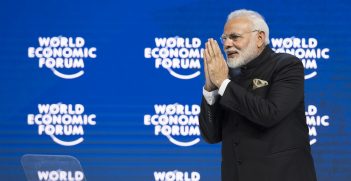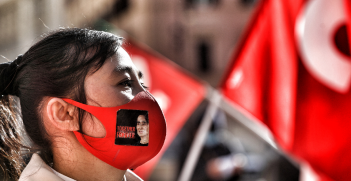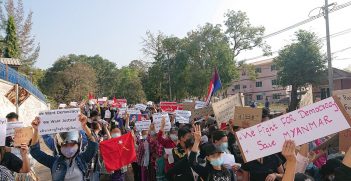The 2022 Philippine Election: A Poll Over Democracy

Philippine democracy slid back towards authoritarianism under President Rodrigo Duterte. Elections on 9 May will usher in new leadership — will the next leader reorient the Philippines towards democracy, or pull the country further towards illiberal rule?
A precipitous decline in democratic freedom has characterised Duterte’s term as president. As many as 30,000 people may have been killed in a “war on drugs” since President Duterte took office in 2016. The president has also captured the judiciary, engineering the ouster of the Supreme Court Chief Justice Maria Lourdes Sereno. He and his allies have applied economic and legal pressure on independent media, so much so that Maria Ressa, founder of the online media website Rappler, was co-recipient of the Nobel Peace Prize for her courageous fight for a free press.
The president also hamstrung the legislature’s balancing role. Senator Leila de Lima, who launched a human rights probe into state-sponsored killings, has been in police detention for drug-related corruption charges since 2017. Duterte employed emergency martial powers far more extensively than his predecessors, stopping short of outright dictatorship. Lethal violence against activists, “red-tagged” as radical insurgents, is on the rise. The peace process with the communist New People’s Army has unsurprisingly stalled.
President Duterte is unable to run for another term due to constitutional limits. A peaceful transition to a new government is a hallmark of democracy. However, there are signs that the regime will remain on an authoritarian trajectory.
Dictator’s Heir
The frontrunner — by far — among the candidates for president, Ferdinand “Bongbong” Marcos Jr., is the son and namesake of ousted dictator Ferdinand Marcos. President Marcos declared martial law in 1972, ruling by decree until a peaceful uprising installed Cory Aquino in 1986. The Marcos dynasty has since sought to return to power.
After returning from exile in 1992, the Marcos family regained political ground in their family bailiwicks of Ilocos and Leyte. As president, Duterte was a key ally — three months into office, he sanctioned a hero’s burial for President Marcos, who had died in 1989. The myth of a Marcos golden age prospered during the Duterte years, as he himself adopted a rhetoric hostile to democracy.
Crucially, there is the matter of government coffers being plundered during authoritarian rule. The Philippine government may be prevented from its ongoing efforts to recover those public funds. Several groups have filed petitions to disqualify Marcos Jr., including human rights advocates and martial law victims from the Campaign Against the Return of the Marcoses and Martial Law (CARMMA) and Task Force Detainees of the Philippines, among others. The Commission on Elections (COMELEC) has dismissed the first of five remaining cases.
Still, the ace in Bongbong Marcos’s hand may be his running mate, Sara Duterte, the president’s daughter and mayor of Davao City. Under a newly minted “UniTeam” banner, the Marcos Jr. and Duterte “Jr.” tandem is the continuity ticket to beat. Consequently, the elder Duterte could be shielded from attempts to hold him to account for human rights violations, particularly the International Criminal Court’s (ICC) investigation of crimes against humanity. The ICC will also scrutinise summary killings in Davao City, including part of Sara Duterte’s term in office as mayor. Continuity overall spells little hope for democratic renewal.
The Promise of Democratic Reform
Philippine democracy remains institutionally weak. Dynastic oligarchs dominate elections. Yet the legacy of democratic restoration in 1986 include a free press, a vibrant civil society, and a constitution that has ultimately constrained even a strongman like Duterte.
On the side of the opposition is incumbent Vice President Leni Robredo. Robredo leads the Liberal Party, the erstwhile ruling party under the late President Noynoy Aquino, Cory Aquino’s son. Robredo entered politics after her husband — and Noynoy Aquino’s interior secretary at the time — Jesse Robredo’s death, winning a seat in Congress in 2013. A relative neophyte in 2016, she defeated Bongbong Marcos in the vice-presidential race by a razor-thin margin.
Robredo had initially taken a cooperative posture with President Duterte and was rewarded with a cabinet position as housing chief until she resigned shortly after. Robredo then took a dissenting stand in a message recorded for a United Nations meeting on extrajudicial killings, hitting hard at the government for summary executions in the “war on drugs.” Duterte later invited Robredo back into the cabinet — in a surreal twist, as co-chair of an anti-illegal drugs body — before firing her 19 days later. Robredo nonetheless produced a report recommending an end to the bloody police operations and an investigation of abuses. As a presidential candidate, Robredo has reiterated her call for accountability and justice for victims of the mass violence campaign.
Running as an independent candidate to shed some baggage from the previous the Aquino administration, Robredo has failed to unite an opposition force behind her. Nonetheless, Robredo has steadily gained in the polls since she announced her candidature — she is now second place, just behind Marcos Jr., while only four months ago, she was in sixth place.
Competition Without Opposition
In the Philippines’ plurality system, the candidate “first past the post” with the most votes wins. A fragmented opposition thus stands little chance if Marcos Jr. solidifies his lead. To complicate matters, President Duterte’s party has no standard bearer. It is unlikely that Duterte would now endorse anyone other than his daughter’s running mate. Still, Duterte has so far withheld his blessing on any of the candidates — a tactic to play kingmaker.
Manila City Mayor Isko Moreno Domagoso of Aksyon Demokratiko (Democratic Action) is a candidate to watch. A Duterte ally, Domagoso briefly played the opposition card. On one hand, the former actor may gain votes from weak Robredo supporters. On the other hand, if he succeeds in his current effort to secure Duterte’s endorsement, Domagoso may draw votes away from Bongbong Marcos.
Also vying for President Duterte’s benediction is Senator Manny Pacquiao, the international boxing champion. Senator Pacquiao had been a member of Duterte’s party, Partido Demokratiko Pilipino-Lakas ng Bayan (Philippine Democratic Party-People’s Power, or PDP-Laban). However, Duterte opposed Pacquiao’s bid for the presidency. Their rift eventually split PDP-Laban into two wings. Duterte claims that Pacquiao has since mended fences to regain the president’s favour.
Voting on the Issues?
Trailing behind are Senator Ping Lacson of Partido Reporma (Reform Party), a former police chief, and labour leader Leody de Guzman of Laban ng Masa (Fight of the Masses). If Lacson drops out, this could encourage some coalescing around Robredo or Domagoso. Meanwhile, de Guzman is running an unexpectedly resilient campaign. Although highly unlikely to win, he and his running mate, socialist intellectual Walden Bello, may pull policy debates leftwards as their campaigns address unemployment and wealth distribution.
Philippine elections are notoriously bereft of serious policy debate, but that may change this year. A key issue will be the incumbent government’s poor handling of the COVID-19 pandemic. Duterte also brought the country diplomatically and economically closer to China — an unpopular move mainly due to Chinese aggression in disputed territories of the South China/West Philippine Sea. Candidates will also need to convince voters that they can revive a stalled economy and upgrade the country’s creaking infrastructure, particularly for internet access.
The biggest question that remains is whether or not voters will assure President Duterte of impunity for gross human rights violations and mass violence. Duterte Sr. hollowed out Philippine democratic institutions, instrumentalised the police for mass violence, and emboldened the military. His successor would be well placed to break, or make, democracy.
This article was one of the top ten most read articles published in 2022.
Dr Sol Iglesias is assistant professor of political science at the University of the Philippines (UP) in Diliman, where she did her undergraduate degree. She has a doctorate in Southeast Asian Studies and a master’s degree in political science from the National University of Singapore, and a master’s in international relations from the Fletcher School at Tufts University.
This article is published under a Creative Commons License and may be republished with attribution.





